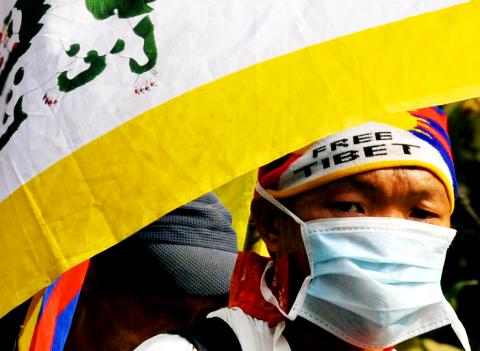Four more Tibetans have set themselves alight in protest at China’s rule and at least 20 students were hospitalized on Monday after a protest turned violent in Qinghai Province’s Hainan Prefecture, US broadcaster Radio Free Asia said in an e-mailed statement, citing Tibetan exile sources.
The spate of burnings in recent weeks began in the run-up to the Chinese Communist Party’s 18th Party Congress and have brought the total for this month to 21, and to 85 since 2009, Radio Free Asia said.
London-based exile group Free Tibet said up to 1,000 students took part in the demonstration.

Photo: AFP
Radio Free Asia said students were angry over a booklet distributed at Tsolho Medical Institute in Hainan’s Chabcha County calling Tibetans irrelevant and saying immolation protests by Tibetans were “acts of stupidity.” It said students burned the books in their protest.
The broadcaster quoted anonymous sources inside China’s Tibetan areas as saying teenaged nun Sangay Dolmas died from self-immolation on Sunday in Qinghai Province’s Tongren County.
On Monday, 18-year-old Kunchok Tsering died after burning himself in Gansu Province’s Xiahe County while a 20-year-old former monk, Wang Gyal, self-immolated in Sichuan Province’s Seda Country, though his condition was not immediately known, it said. In Gansu’s Luqu County, 24-year-old Gonpo Tsering died after setting himself ablaze, the report said.
“We are now receiving reports of self-immolation protests on an almost daily basis,” Free Tibet director Stephanie Brigden said. “Allied to the many other forms of protests which Tibetans are undertaking — marching, leafleting, displaying banned images and exerting Tibetan culture — it forms an unimpeachable argument for an end to Chinese occupation.”
“Although we cannot confirm whether security forces beat students or not, it would appear that the change in Chinese leadership has not led to a change in the brutality which passes for government in Tibet,” Brigden added.
Beijing has accused exiled Tibetan spiritual leader the Dalai Lama of inciting the self-immolations.
He has preferred to remain neutral on the acts in public statements, but has urged the Chinese government to investigate, saying: “China does not look into it seriously and tries to end [the incidents] only by criticizing me.”

US President Donald Trump yesterday announced sweeping "reciprocal tariffs" on US trading partners, including a 32 percent tax on goods from Taiwan that is set to take effect on Wednesday. At a Rose Garden event, Trump declared a 10 percent baseline tax on imports from all countries, with the White House saying it would take effect on Saturday. Countries with larger trade surpluses with the US would face higher duties beginning on Wednesday, including Taiwan (32 percent), China (34 percent), Japan (24 percent), South Korea (25 percent), Vietnam (46 percent) and Thailand (36 percent). Canada and Mexico, the two largest US trading

ACTION PLAN: Taiwan would expand procurement from the US and encourage more companies to invest in the US to deepen bilateral cooperation, Lai said The government would not impose reciprocal tariffs in retaliation against US levies, President William Lai (賴清德) said yesterday, as he announced five strategies to address the issue, including pledging to increase Taiwanese companies’ investments in the US. Lai has in the past few days met with administrative and national security officials, as well as representatives from various industries, to explore countermeasures after US President Donald Trump on Wednesday last week announced a 32 percent duty on Taiwanese imports. In a video released yesterday evening, Lai said that Taiwan would not retaliate against the US with higher tariffs and Taiwanese companies’ commitments to

‘SPECIAL CHANNEL’: Taipei’s most important tasks are to stabilize industries affected by Trump’s trade tariffs and keep negotiations with Washington open, a source said National Security Council Secretary-General Joseph Wu (吳釗燮) arrived in the US for talks with US President Donald Trump’s administration, a source familiar with the matter said on Friday. Wu was leading a delegation for a meeting known as the “special channel,” the Financial Times reported earlier. It marked Trump’s first use of the channel since returning to the White House on Jan. 20. Citing a source familiar with the matter, the Financial Times reported that Minister of Foreign Affairs Lin Chia-lung (林佳龍) was also a part of the delegation. The visit came days after China concluded war games around Taiwan and amid Trump’s

CHIP EXCEPTION: An official said that an exception for Taiwanese semiconductors would have a limited effect, as most are packaged in third nations before being sold The Executive Yuan yesterday decried US President Donald Trump’s 32 percent tariff on Taiwanese goods announced hours earlier as “unfair,” saying it would lodge a representation with Washington. The Cabinet in a statement described the pledged US tariffs, expected to take effect on Wednesday next week, as “deeply unreasonable” and “highly regrettable.” Cabinet spokeswoman Michelle Lee (李慧芝) said that the government would “lodge a solemn representation” with the US Trade Representative and continue negotiating with Washington to “ensure the interests of our nation and industries.” Trump at a news conference in Washington on Wednesday announced a 10 percent baseline tariff on most goods